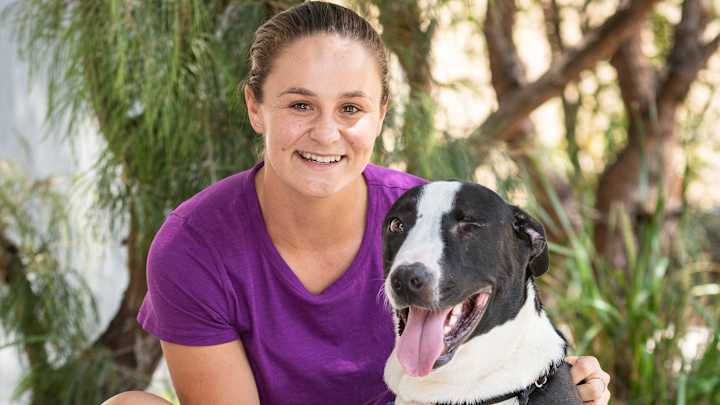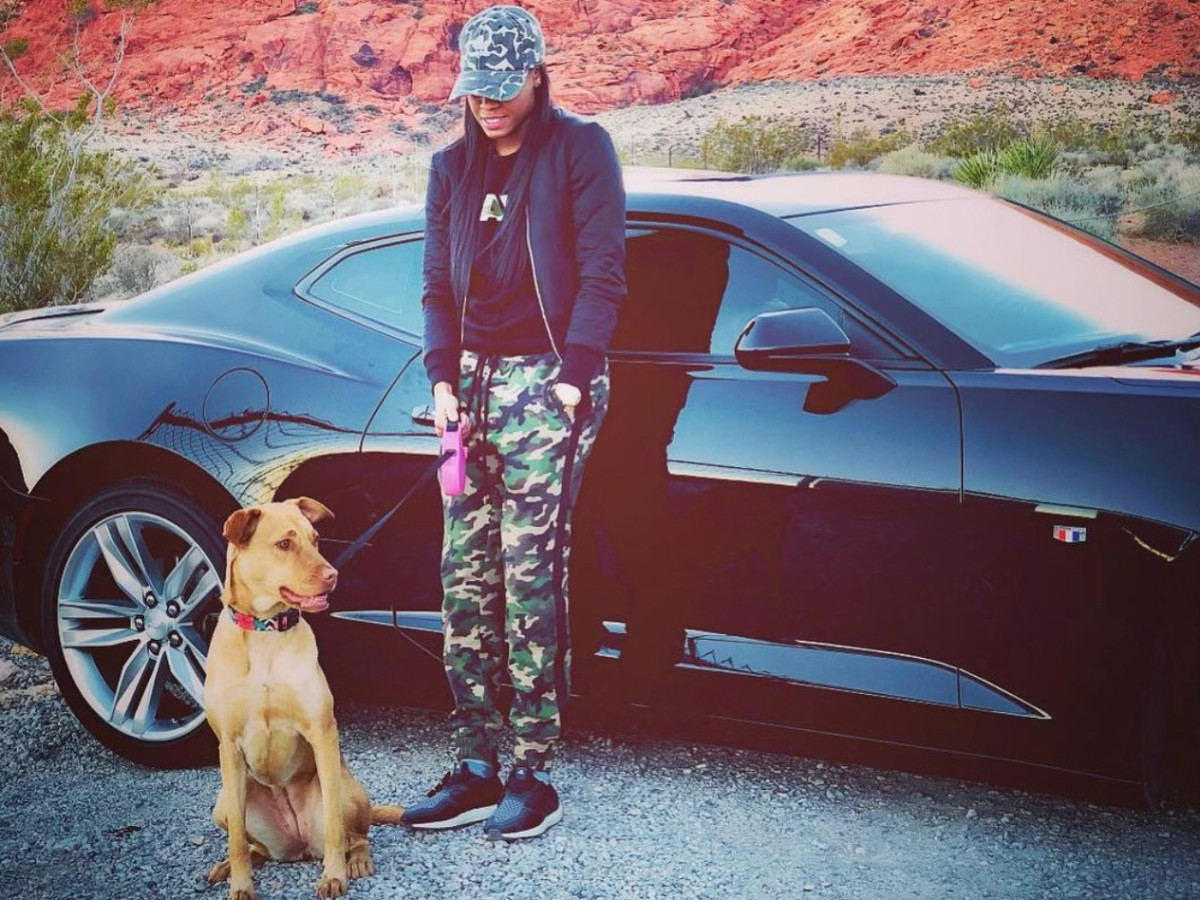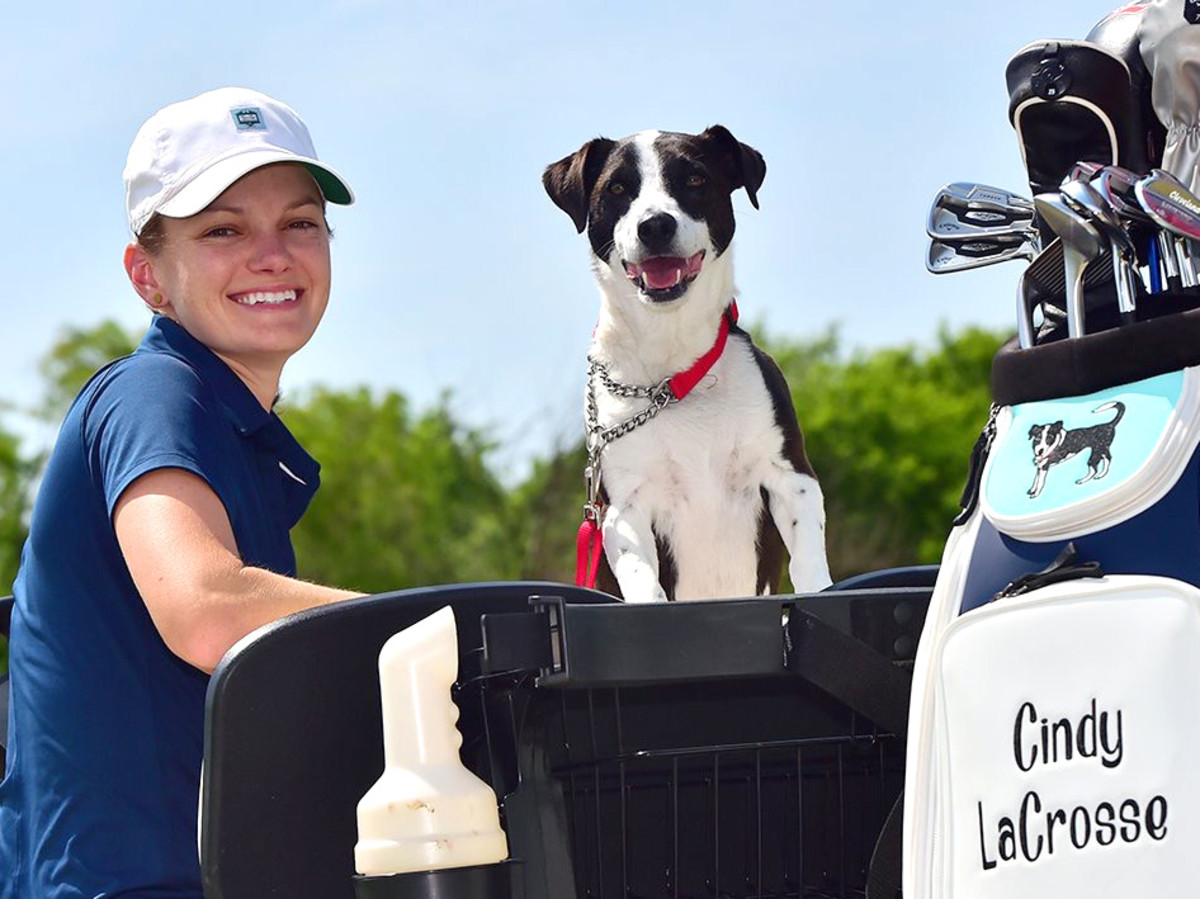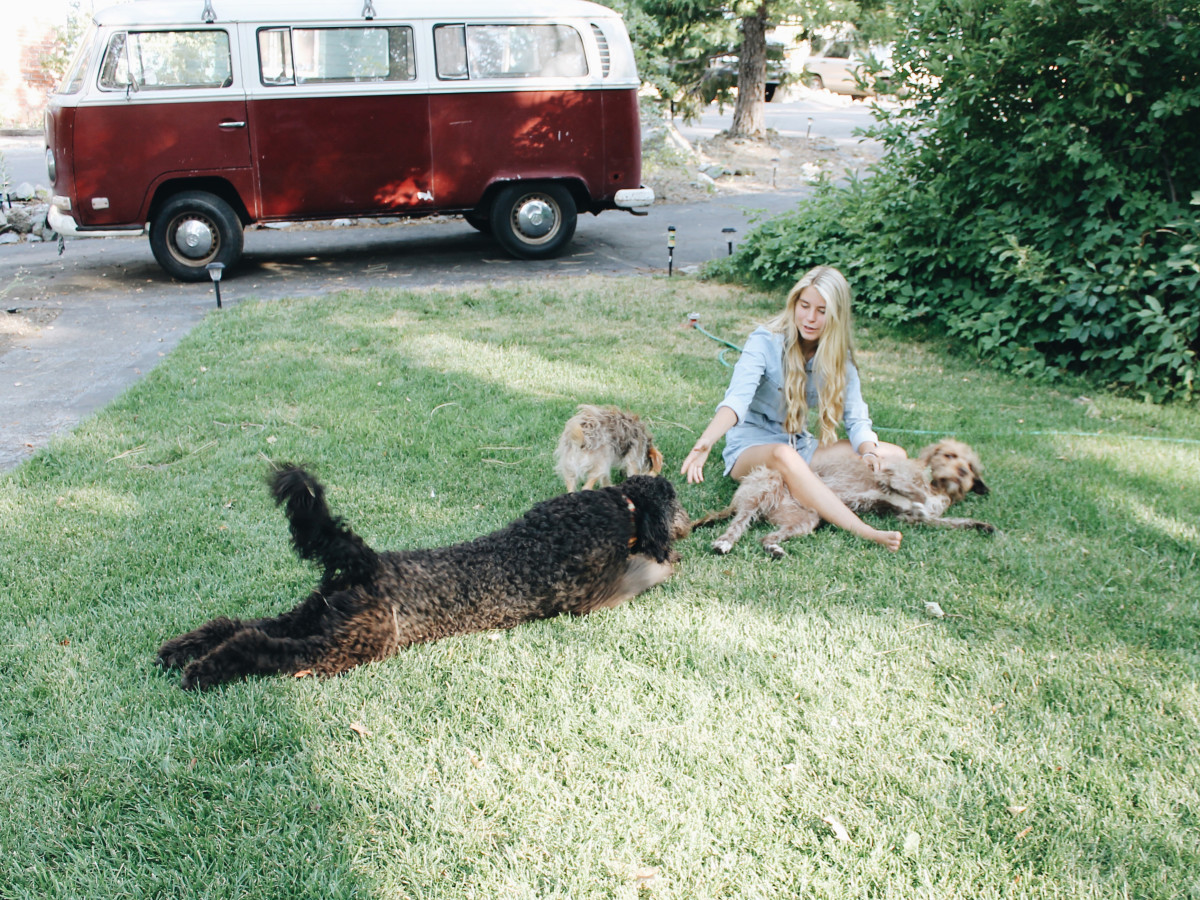‘Our House Is Run by Dogs’: How Rescue Pups Play an Essential Role for Many Athletes

Ash Barty is the top-ranked tennis player in the world, the reigning Wimbledon champion and was the No. 1 seed in the U.S. Open. But none of that matters to her dogs. To them, Barty’s just “mum.”
“Dogs provide a beautiful sense of perspective,” says Barty. “They don’t care if I won or lost. They love me just the same.”
And since October is Adopt-A-Dog Month, GoodSport spoke with Barty and three other athletes who have adopted animals about the deep bond that players have with their rescue pups. After all, dogs make the best teammates. Their four-legged friends are members of the family who help them relieve stress, forget tough losses and even serve as workout buddies.

ASH BARTY’S ‘WOLFPACK’
Barty and her partner, Garry Kissick, affectionately call their five dogs “the wolfpack.” The brood includes Rudy, Maxi, Affie, Chino and their newest addition, Origi.
“Our house is run by dogs,” says Barty, 25. “Garry got Origi, a border collie, last year. She’s beautiful. Maxi and Rudy live right around the corner with my mum and dad. Coming home and cuddling my dogs on the couch is one of the most enjoyable things for me.”
The two-time major champion’s commitment to rescue dogs extends beyond her household. Barty—who grew up and still lives in Ipswich, Australia, when she’s not on tour—became an ambassador for the Royal Society for the Prevention of Cruelty to Animals (RSPCA) in 2018. Barty’s role includes helping raise awareness for the organization, visiting the shelter when she is home and donating funds. In ’19, Barty gave all the cash she won from her Fed Cup Heart Award to the animal welfare organization.
“I wanted to give back to a cause I was passionate about,” says Barty. “The RSPCA Queensland shelter isn’t far from my home, and when I first visited there I knew I wanted to help. Seeing anyone mistreat animals is something I find very hard to bear. I hope my involvement can contribute in some way to the wonderful work the RSPCA team does.”

MORIAH JEFFERSON AND KOBIE
A few months after the San Antonio Stars selected her in the first round of the 2016 WNBA draft, Moriah Jefferson visited Pets Alive, a local animal shelter, with her new teammates. Jefferson, a Texas native who had grown up with a menagerie of pets, was on hand to help out with an adoption drive, but she didn’t expect to meet her new best friend.
“As soon as I walked in, one of the dogs who was up for adoption ran up to me,” says Jefferson, now a guard for the Dallas Wings. Ginger, a golden retriever mix with light eyes and floppy ears, wouldn’t leave her side. “Every time I moved, she moved with me. I played with her for about two hours.”
Jefferson, a former UConn star and one of only three players in NCAA history to win four national championships, wasn’t looking for a pet. Still adjusting to life as a professional basketball player, Jefferson knew that she would be on the road for long stretches.
“I kept telling myself, ‘I can't really have a dog right now. I just need to help her get rescued,’ ” says Jefferson.
She reluctantly left the shelter without Ginger and went on a road trip the next day, but the dog remained on her mind.
“Something was just telling me I had to get this dog,” says Jefferson. “So I called my mom, who was living in San Antonio at the time, and told her about the dog. She said, ‘If you really want her, get her.’ She told me, ‘When you go on the road, I'll watch her for you.’ ”
Jefferson called the shelter and learned Ginger hadn’t been adopted yet, so she asked her PR rep to pick up the pup and keep her for the night until she got back. When she reunited with the dog the next day, Jefferson knew immediately she had made the right choice. Eventually, Jefferson changed Ginger’s name to Kobie, in honor of Kobe Bryant, her favorite player. Kobie, in turn, changed Jefferson’s life.
“We played together at the dog park for hours and then came home,” says Jefferson. “She climbed into my arms and we both just fell asleep on the couch. It was just meant to be. The best part about being a dog mom is that when I walk through the door, she’s just as excited to see me as she was the first time she ever saw me. I can have a bad game, or be having a terrible day, but then I walk in and see Kobie, and it just changes everything.”
Jefferson met Bryant after he reached out to let her know that his daughter, Gigi, was a fan of hers and studied game film of Jefferson when she was at UConn. Jefferson and Bryant eventually trained together and became friends.
“He thought it was pretty cool that I had named Kobie after him. He loved dogs too,” Jefferson says. “He said he wanted to meet her one day. Unfortunately, that didn't get to happen.”
A photo of Kobie wearing Bryant’s jersey remains the background on Jefferson’s phone. After Kobe and Gigi Bryant died in a helicopter crash in 2020, Kobie helped Jefferson grieve.
“When basketball—or life—is kind of closing in on me, I take Kobie for a hike,” Jefferson says. “We’ll walk for hours. She helps me escape from the world sometimes.”

CINDY LACROSSE AND FITZ
Cindy LaCrosse’s Twitter bio reads “LPGA golfer and Fitz’s human.”
Fitz is the 6-year-old Terrier mix LaCrosse adopted from a foster home in West Palm Beach. He’s also LaCrosse’s best friend.
“I got Fitz at a low point in my life,” says LaCrosse. “I had just lost full status on the LPGA tour. I have made a lot of friends on tour, but golf can be a lonely profession. I told my family that I was thinking about getting [a dog]. They thought it was a great idea.”
So LaCrosse started scouring rescue sites for a smaller dog who could accompany her on tour, and that’s when she found Fitz, a terrier mix, on Petfinder.com. He was being fostered through an organization based in West Palm Beach called Haven Rescue. Fitz quickly became a fixture in LaCrosse’s life—and on tour.
“He was the perfect traveling companion,” says LaCrosse. “He’s great on car rides. He’s been all over the U.S., to Canada. He’s made friends with all the caddies. He kind of changed my life.”
LaCrosse decided to pay it forward and help to change the lives of other dogs. While babysitting her nephew in Tampa in 2017, LaCrosse brought food and toys over to the local humane society, and an idea blossomed. LaCrosse began collecting supplies and delivering them to animal shelters near stops on the LPGA Tour, and started sharing pictures and videos of animals looking for homes.
“My hope was that people would see the tweets and donate their old towels or blankets or toys to the shelters,” says LaCrosse. “These shelters need things every day, and these dogs need homes.”
In 2018, while she was competing in the NW Arkansas Championship, LaCrosse not only stopped at the local Humane Society, but she also volunteered to cover the adoption costs for anyone who adopted a dog during the tournament.
Lacrosse retired from professional golf at the end of 2019, but she found that she missed the competition—and her former competitors missed seeing Fitz. When she returned to play the LPGA Pure Silk Championship tournament in Williamsburg, Va., in May—LaCrosse’s first tournament in over a year—Fitz received a hero’s welcome. LaCrosse, who now teaches lessons at a golf course on Long Island and plays part-time on the LPGA Tour, is just fine with Fitz being the star of the show.
“Nobody cared that they hadn’t seen me for a while,” says Lacrosse with a laugh. “But everyone was very excited to see my dog. Almost every person I saw would say, ‘Hey, how's Fitz?’ I am totally O.K. being known as Ftiz’s human. If that’s what I’m known for on tour, it’s cool. I have a really good dog.”

MADDIE MASTRO AND HER FOUR ‘MUTTS’
Not long after she took up snowboarding at age 6, Maddie Mastro earned her first nickname: Mad Dog.
“I don't remember who came up with it, but I can't remember a time when I wasn’t called Mad Dog,” says Mastro. “It became my nickname on the mountain.”
The nickname suited the daredevil’s hard-charging, high-flying style as she chased her older brother, Cameron, around California's Mammoth Mountain. It was also a nod to two of her favorite things: her board and her best friends.
“I was one of those kids who was crazy about dogs,” Mastro says.
At 17, Mastro earned a berth on the U.S. Olympic women's snowboarding team for the 2018 Winter Games in Pyeongchang, where she made it all the way to the final round of competition. At the U.S. Open in March ’19, Mastro won her first title and made history, becoming the first woman to land a double crippler—a challenging pair of half-twist backflips—in a half-pipe in competition.
Now 21, Mastro is seeking a second shot on her sport's grandest stage—she’s one of the favorites to earn a spot on the four-woman U.S. halfpipe squad for the 2022 Winter Olympics in Beijing. When she’s not busy training, Mastro spends her downtime with her rescue dogs.
“It’s so nice to come home and just have these happy pups running around the house,” says Mastro, noting that they also make for good cross-training buddies. “I go on hikes with them and teach them tricks. All the animals I’ve grown up with are rescued. ‘Adopt, don’t shop’ is something that I’ve heard my whole life. There are so many dogs in this world that need homes.”
Archie, the family’s original rescue dog, rules the roost. The smallest dog of the bunch—Archie is a terrier-chihuahua mix—was found by Mastro and her family at one of her soccer games while roaming the fields as a stray pup. Even though Archie was covered in fleas and ticks, Mastro says that her mom, Eileen, was drawn to him.
“He sat on my mom’s lap the whole game,” says Mastro. “Nobody claimed him, so we took him home.”
The family eventually added three canine siblings for Archie—Beasley, Zody, and Stevie.
“Archie is definitely still the boss,” says Mastro. “He lets the others know when they’re getting too rowdy or need to calm down. Beasley is a medium-sized terrier–pit bull mix. We got him from a pound. Zody, a labradoodle, came from a rescue organization. The newest addition is Stevie. I call her the Tasmanian devil. She'll go up to the bigger dogs and bite their tails, trying to get them to play with her. She’s like their annoying little sister.”
When she was competing in PyeongChang, Mastro read about the dog meat trade in South Korea. Horrified, she decided that she wanted to visit a South Korean meat farm in hopes of rescuing dogs who were slated to be slaughtered.
“I wanted to help, and I wanted to use my platform and educate people about what’s happening, but I didn’t know how to get into the dog meat farms, or how to advocate for the dogs there,” says Mastro. “Then someone reached out to my mom on Facebook about a rescue organization that works in South Korea. They asked if I could be a flight buddy for a dog that the organization had rescued.”
Save Korean Dogs, which works with California-based rescue The Barking Lot, helps transport dogs to the U.S. for adoption. Mastro changed her flight home so that she could travel on a dog-friendly carrier to LAX and accompanied Jadu, a Korean Jindo who was rescued from a meat plant. Not long after Jadu arrived in California, she was adopted by a family in San Diego.
“My parents said that we already had enough dogs,” says Mastro. “But Jadu found a forever home with a great family. I was just happy to play a small part in helping even one dog.”
Mastro’s own dogs repay that passion in spades. Mastro wasn’t able to see them for several months in 2020 because of the pandemic, and her training suffered. When they reunited last summer, the pups provided the perfect panacea.
“When I am in a funk or feeling down about whatever's going on with my sport, they help me relax,” says Mastro. “They are just good companions. They make my life so much better. I’m a lot happier when I have dogs around.”
Amiee Crawford is a contributor for GoodSport, a media company dedicated to raising the visibility of women and girls in sports.
